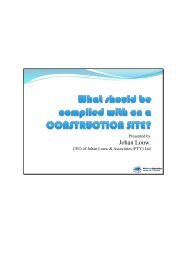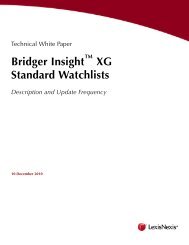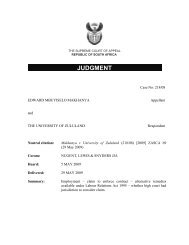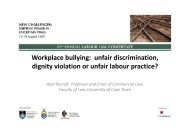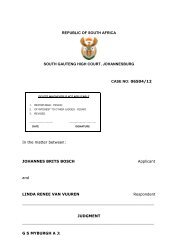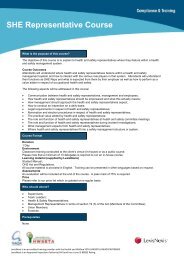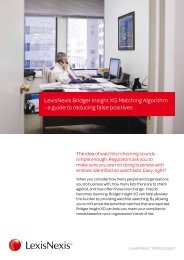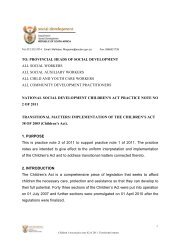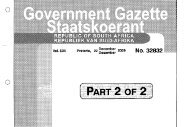Mogothle v Premier of the Northwest Province and others
Mogothle v Premier of the Northwest Province and others
Mogothle v Premier of the Northwest Province and others
Create successful ePaper yourself
Turn your PDF publications into a flip-book with our unique Google optimized e-Paper software.
MOGOTHLE v PREMIER OF THE NORTH WEST PROVINCE & ANOTHER[2009] 4 BLLR 331 (LC) 333suspension was extended. His action was based on an alleged breach <strong>of</strong> contract, allegedfailure by <strong>the</strong> respondents to comply with <strong>the</strong> provisions <strong>of</strong> <strong>the</strong> disciplinary code formanagers in <strong>the</strong> public service, <strong>and</strong> an alleged violation <strong>of</strong> his rights under <strong>the</strong> Promotion<strong>of</strong> Administrative Justice Act 3 <strong>of</strong> 2000 (“PAJA”). The respondent argued that <strong>the</strong> matterwas not urgent, that <strong>the</strong> Court lacked jurisdiction to entertain <strong>the</strong> matter <strong>and</strong> that, in anyevent, <strong>the</strong> applicant’s enforced “leave <strong>of</strong> absence” was lawful.The Court observed that <strong>the</strong> judgment in Chirwa v Transnet Ltd & o<strong>the</strong>rs [2008] 2BLLR 97 (CC) cast considerable doubt on whe<strong>the</strong>r <strong>the</strong> applicant could claim relief under<strong>the</strong> PAJA. However, <strong>the</strong> Court declined to rule on that point, since it sufficed to consideronly whe<strong>the</strong>r <strong>the</strong> Labour Court had jurisdiction to entertain <strong>the</strong> applicant’s claim undercontract. The Court noted in this regard that in three recent judgments, <strong>the</strong> SupremeCourt <strong>of</strong> Appeal has emphasised <strong>the</strong> mutual relationship <strong>of</strong> trust <strong>and</strong> confidence imposedby <strong>the</strong> common law contract <strong>of</strong> employment (see Old Mutual Life Assurance Co SA Ltd vGumbi [2007] 8 BLLR 699 (SCA); Boxer Superstores Mthatha & ano<strong>the</strong>r v Mbenya[2007] 8 BLLR 693 (SCA); <strong>and</strong> Murray v Minister <strong>of</strong> Defence [2008] 6 BLLR 513(SCA)). Although <strong>the</strong> development <strong>of</strong> <strong>the</strong> element <strong>of</strong> fairness in <strong>the</strong> common law contract<strong>of</strong> employment was controversial, <strong>the</strong> SCA had unequivocally established a contractualright to fair dealing which binds all employers <strong>and</strong> confers on all employees a rightto enforce that right, which exists independently <strong>of</strong> statutory protection against unfairdismissal <strong>and</strong> unfair labour practice. The Court held that, in <strong>the</strong> absence <strong>of</strong> any higherauthority to <strong>the</strong> contrary, it was obliged to follow <strong>the</strong> SCA judgments.The Court noted fur<strong>the</strong>r that <strong>the</strong> respondent had argued that on a “broad reading”, <strong>the</strong>Chirwa judgment had impliedly overruled <strong>the</strong> SCA judgments. On that point, <strong>the</strong> Courtnoted that <strong>the</strong> Chirwa judgment could be read on two levels. Narrowly construed, <strong>the</strong>judgment dealt only with whe<strong>the</strong>r <strong>the</strong> High Court had jurisdiction to entertain claims bydismissed public servants. At a more general level, <strong>the</strong> Chirwa judgment suggests that allemployment-related disputes involving allegations <strong>of</strong> unfair conduct by employersshould be decided in <strong>the</strong> dispute resolution forums established under <strong>the</strong> Labour RelationsAct 66 <strong>of</strong> 1995 (“<strong>the</strong> LRA”). The latter reading would mean that, in <strong>the</strong> light <strong>of</strong>Chirwa, any remedy established by <strong>the</strong> LRA must be pursued to <strong>the</strong> exclusion <strong>of</strong> anyright that may previously have existed. However, although <strong>the</strong> Chirwa judgment constitutesan obvious endorsement <strong>of</strong> <strong>the</strong> mechanisms, institutions <strong>and</strong> remedies created by<strong>the</strong> LRA, <strong>the</strong> judgment did not expressly exclude <strong>the</strong> right <strong>of</strong> employees to pursuecontractual claims ei<strong>the</strong>r in <strong>the</strong> Labour Court by virtue <strong>of</strong> <strong>the</strong> provisions <strong>of</strong> <strong>the</strong> BasicConditions <strong>of</strong> Employment Act 75 <strong>of</strong> 1997 (“<strong>the</strong> BCEA”) or in a civil court with <strong>the</strong>requisite jurisdiction. If <strong>the</strong> Constitutional Court wished to override three judgments <strong>of</strong><strong>the</strong> SCA, it would have done so in express terms.The Court held fur<strong>the</strong>r that <strong>the</strong> concurrent jurisdiction <strong>of</strong> <strong>the</strong> Labour Court <strong>and</strong> <strong>the</strong>civil courts in matters concerning contracts <strong>of</strong> employment did not conflict with <strong>the</strong>policy considerations expressed in Chirwa. The BCEA, enacted two years after <strong>the</strong> LRA,was also <strong>the</strong> product <strong>of</strong> negotiation between <strong>the</strong> social partners. By enacting section77(3) <strong>of</strong> <strong>the</strong> BCEA, <strong>the</strong> drafters acknowledged that disputes concerning contracts <strong>of</strong>employment had not been eclipsed by <strong>the</strong> LRA. Any problems that might be created by<strong>the</strong> concurrent jurisdiction <strong>of</strong> <strong>the</strong> Labour Court <strong>and</strong> civil courts in disputes concerningcontracts <strong>of</strong> employment would be for <strong>the</strong> Legislature to resolve.Turning to <strong>the</strong> merits, <strong>the</strong> Court noted that <strong>the</strong> suspension <strong>of</strong> an employee pending aninquiry into alleged misconduct is equivalent to an arrest, <strong>and</strong> should <strong>the</strong>refore be usedonly when <strong>the</strong>re is a reasonable apprehension that <strong>the</strong> employee will interfere withinvestigations or pose some o<strong>the</strong>r threat. The Court noted that <strong>the</strong>re have been twoapproaches to “preventive” suspension – one holding that a hearing before suspensionwas not necessary, <strong>the</strong> o<strong>the</strong>r holding that it is. The second approach is consistent with fairdealing in <strong>the</strong> employment context. This requires that an employee should not be suspendedunless <strong>the</strong>re are prima facie grounds for believing that <strong>the</strong> employee has committedserious misconduct <strong>and</strong> <strong>the</strong>re is some objectively justifiable reason for excluding <strong>the</strong>ABCDEFGHIJ




